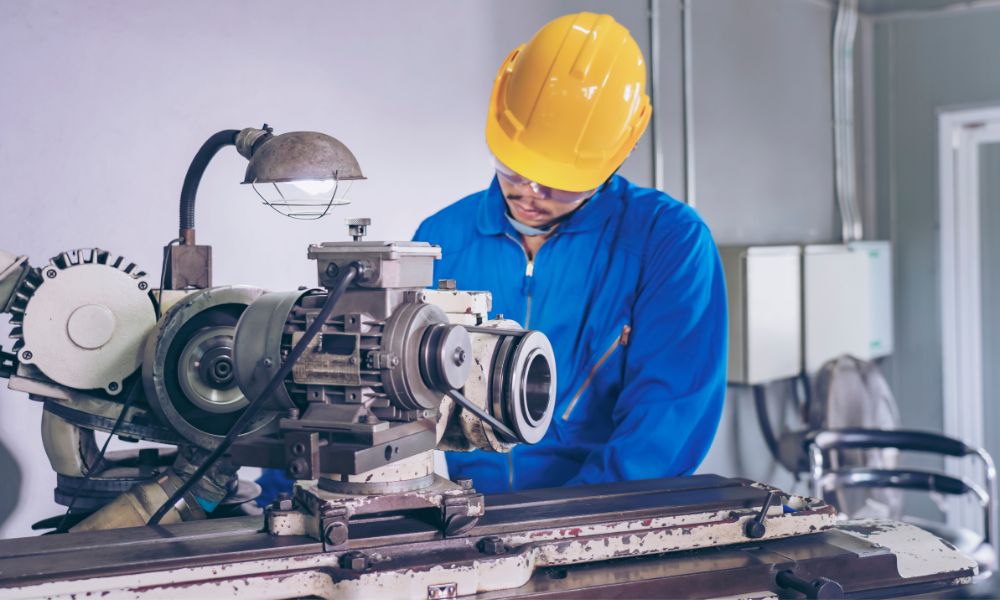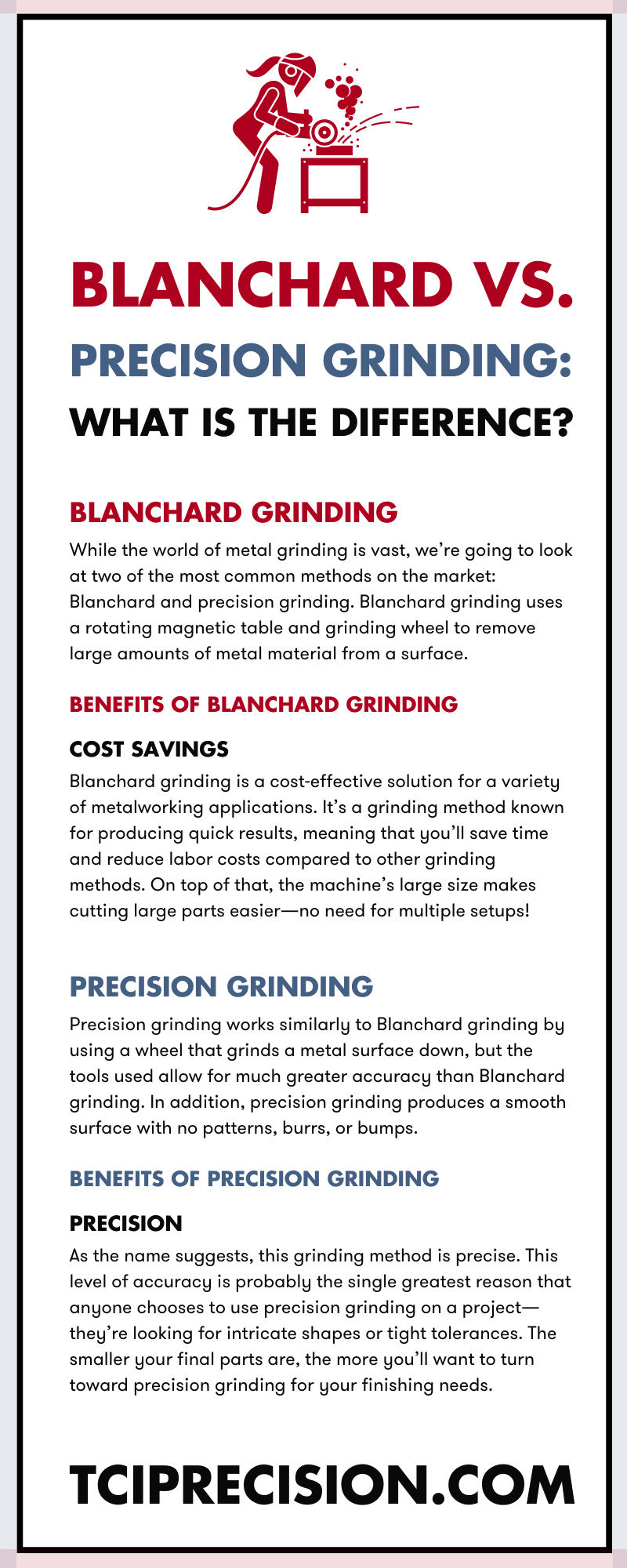Blanchard vs. Precision Grinding: What Is the Difference?

The time comes in every project when you need to move from development to production. However, you may not be sure which grinding method is best for your production needs—that’s where we come in. We’re here to share some of the services we offer and give you a better idea of what they entail.
This article discusses the differences between Blanchard and precision grinding and what you can expect from each method.
What Is Grinding?
Like any cutting process, grinding reduces areas of the metal material that are unnecessary to the final product. At a glance, it makes sense to think of grinding as a version of trimming or shearing since the end goal is the same. However, grinding is a very different form of cutting than these other options.
While you can certainly consider grinding to be a type of cutting method, it is more commonly seen as a finishing method, as it is one of the most effective ways to hone metal parts to their intended dimensions. Grinding can also boost the surface quality of a product that has already been ground to the proper dimensions.
This process works by using a grinding wheel with an abrasive edge. The wheel turns at high speed and scrapes against the metal pieces until they reach the desired shape or finish.
Blanchard Grinding
While the world of metal grinding is vast, we’re going to look at two of the most common methods on the market: Blanchard and precision grinding. Blanchard grinding uses a rotating magnetic table and grinding wheel to remove large amounts of metal material from a surface.
Thanks to the magnetic table, the grinding wheel rotates rapidly while the metal you’re working on stays in place. Due to the circular motion of the grinding wheel, metal workers characterize Blanchard grinding by its unique cross-hatching pattern on the metal’s surface.
Most often, people seek out Blanchard grinding when they need a way to remove large amounts of material quickly, efficiently, and relatively accurately.
Benefits of Blanchard Grinding
There are a few reasons to consider Blanchard grinding for your next project.
Cost Savings
Blanchard grinding is a cost-effective solution for a variety of metalworking applications. It’s a grinding method known for producing quick results, meaning that you’ll save time and reduce labor costs compared to other grinding methods. On top of that, the machine’s large size makes cutting large parts easier—no need for multiple setups!
Versatile Applications
Blanchard grinding is also a method that allows you to grind a range of metal parts, from casings to forgings and weldments. Blanchard grinding can excel at the task, whether you need to grind flat surfaces or remove stock from a thick material.
Considerations for Blanchard Grinding
In addition to those benefits, there are a few other factors to consider before selecting Blanchard grinding as your method of choice.
Reduced Precision
Traditionally, many see grinding as a precision job. While Blanchard grinding is not the least precise grinding method, it is certainly not the most, either. Blanchard grinding can be an excellent option for you if your tolerance is over 0.001 inches (or tolerance is a non-issue).
Grinding Mark
In addition, we previously mentioned Blanchard grinding’s characteristic cross-hatching pattern. In most cases, people seem to find this pattern to be aesthetically pleasing. However, if you are looking for metal that is blank and free from markings, Blanchard grinding may not be for you.
Precision Grinding
If Blanchard grinding is the go-to method for a quicker, rougher finish, precision grinding is the go-to method for the opposite: high accuracy finish on smaller parts. There are a few different types of precision grinding, from horizontal surface grinding to cylindrical grinding. Each of these methods falls into the “precision grinding” category and prioritizes accuracy above anything else.
Precision grinding works similarly to Blanchard grinding by using a wheel that grinds a metal surface down, but the tools used allow for much greater accuracy than Blanchard grinding. In addition, precision grinding produces a smooth surface with no patterns, burrs, or bumps.
Benefits of Precision Grinding
Why should you consider precision grinding for your project? Here are a few reasons:
Precision
As the name suggests, this grinding method is precise. This level of accuracy is probably the single greatest reason that anyone chooses to use precision grinding on a project—they’re looking for intricate shapes or tight tolerances. The smaller your final parts are, the more you’ll want to turn toward precision grinding for your finishing needs.
Smooth Finish
On top of that, you can rely on precision grinding to produce a smooth finish, unlike Blanchard grinding. This smoothness makes finishing your product with a paint or powder coating much easier.
Considerations for Precision Grinding
Just as there are a few things to keep in mind for Blanchard grinding, here are some potential drawbacks to precision grinding you should be aware of:
Small Applications
It’s best to use the precision grinding technique when working on a small scale, making it a less-than-ideal solution for larger pieces of material. Think about whether you’re planning to shear off significant chunks of metal—if you are, Blanchard grinding may be the more efficient choice for you.
Not as Fast
Finally, it’s important to note that, compared to Blanchard grinding, precision grinding is much slower. Its slow speed allows for greater precision and a higher level of accuracy, but it is certainly something to consider if your project requires fast results. If you would prefer speed over accuracy, you might want to choose Blanchard grinding.
When you find yourself in need of metal services, whether they involve Blanchard or precision grinding (or another service entirely), you can count on TCI Precision Metals for assistance!
Now that you understand the differences between Blanchard and precision grinding, we hope you can see that each option has its optimal use case. Whether your products require Blanchard or precision grinding, the team here at TCI Precision Metals can help. If you’re looking for excellent results and top-tier customer service, you’re in the right place!

